Related Research Articles

The 1950 United Kingdom general election was the first to be held after a full term of a majority Labour government. The general election was held on Thursday 23 February 1950, and was also the first to be held following the abolition of plural voting and university constituencies. The government's lead over the Conservative Party shrank dramatically, and Labour was returned to power but with an overall majority significantly reduced from 146 to just 5. There was a 2.8% national swing towards the Conservatives, who gained 90 seats. Labour called another general election the following year, which the Conservative Party won, returning Churchill to government after six years in opposition.

The 1951 United Kingdom general election was held twenty months after the 1950 general election, which the Labour Party had won with a slim majority of just five seats. The Labour government called a snap election for Thursday 25 October 1951 in the hope of increasing its parliamentary majority.
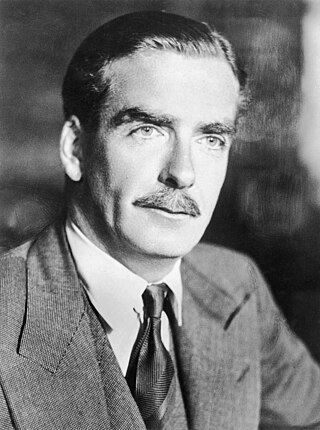
The 1955 United Kingdom general election was held on Thursday 26 May 1955, four years after the previous general election in 1951. It was a snap election: after Winston Churchill retired in April 1955, Anthony Eden took over and immediately called the election in order to gain a mandate for his government. It resulted in a majority of 60 seats for the government; the result remains the largest party share of the vote at a post-war general election. This was the first general election to be held during the reign of Elizabeth II. She had succeeded her father George VI the year after the previous election.

The 1936 United States House of Representatives elections were elections for the United States House of Representatives to elect members to serve in the 75th United States Congress. They were held for the most part on November 3, 1936, while Maine held theirs on September 14. They coincided with President Franklin D. Roosevelt's landslide re-election. Roosevelt's Democratic Party gained twelve net seats from the Republican Party, bringing them above a three-fourths majority. This was the largest majority since Reconstruction, as the last time a party won so decisively was in 1866. To date, this was the last time that any party held three-quarters of all House seats, as well as the last time that a party won more than 300 House seats.
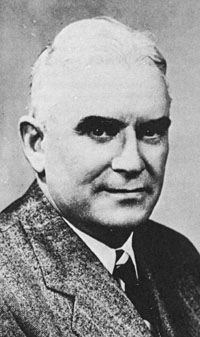
The 1952 British Columbia general election was the 23rd general election in the Canadian province of British Columbia. It was held to elect members of the Legislative Assembly of British Columbia, alongside a plebiscite on daylight saving time and liquor. The election was called on April 10, 1952, and held on June 12, 1952. The new legislature met for the first time on February 3, 1953.
The 1951 Ontario general election was held on November 22, 1951, to elect the 90 members of the 24th Legislative Assembly of Ontario of the Province of Ontario.
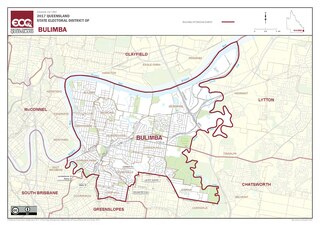
Bulimba is an electoral district of the Legislative Assembly in the Australian state of Queensland.
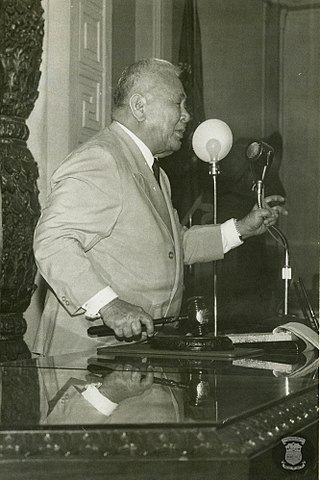
Elections for the members of the Senate were held on November 10, 1953 in the Philippines. Incumbent President Elpidio Quirino of the Liberal Party lost his opportunity to get a second full term as President of the Philippines to former Defense Secretary Ramon Magsaysay of the Nacionalista Party. Quirino's running mate, Senator Jose Yulo lost to Senator Carlos P. Garcia. Vice President Fernando Lopez did not run for re-election and ran for the Senate instead, in which he emerged as the candidate with the most votes. This was the first time that an elected president did not come from the Senate. To further compound the Liberal Party's woes, they also failed to win any seats in the Senate in this election.

Elections for the members of the Senate were held on November 8, 1949 in the Philippines.

Elections for the members of the Senate were held on April 23, 1946, in the Philippines.
The 1943 Darwen by-election was a by-election held on 15 December 1943 for the British House of Commons constituency of Darwen in Lancashire.

A senatorial election was held in the Philippines on November 13, 1951. This election was known as a midterm election, and the date when elected candidates took office fells halfway through President Elpidio Quirino's four-year term.

The 1954 Australian federal election were held in Australia on 29 May 1954. All 121 seats in the House of Representatives were up for election, but no Senate election took place. The incumbent Liberal–Country coalition led by Prime Minister Robert Menzies defeated the opposition Labor Party led by H. V. Evatt, despite losing the two-party preferred vote. Although the ALP won the two-party preferred vote, six Coalition seats were uncontested compared to one ALP seat. The Psephos blog makes clear that if all seats had been contested, the Coalition would have recorded a higher primary vote than the ALP and possibly also a higher two-party preferred vote.

The 1951 Australian federal election was held in Australia on 28 April 1951. All 121 seats in the House of Representatives and all 60 seats in the Senate were up for election, due to a double dissolution called after the Senate rejected the Commonwealth Bank Bill. The incumbent Liberal–Country coalition led by Prime Minister Robert Menzies defeated the opposition Labor Party led by Ben Chifley with a modestly reduced majority, and secured a majority in the Senate. This was the last time the Labor party ever held a Senate majority. Chifley died just over a month after the election. This was the sixth and last federal election prior to the death of George VI a year later.

The 1949 Australian federal elections was held on Saturday December 10, All 121 seats in the House of Representatives and 42 of the 60 seats in the Senate were up for election. The incumbent Labor Party, led by Prime Minister Ben Chifley, was defeated by the opposition Liberal–Country coalition under Robert Menzies in a landslide. Menzies became prime minister for a second time, his first period having ended in 1941. This election marked the end of the 8-year Curtin-Chifley Labor government that had been in power since 1941 and started the 23-year Liberal/Country Coalition government. This was the first time the Liberal party won government at the federal level.
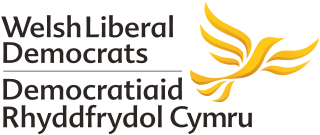
The Welsh Liberal Democrats is a liberal, federalist political party in Wales, part of UK Liberal Democrats. The party is led by Jane Dodds, who has served as an MS for Mid and West Wales since May 2021. The party currently has one elected member in the Senedd and one Welsh seat in the UK House of Commons. It also has several members of the House of Lords. The party had 69 local councillors serving in principal authorities as of the 2022 local authority elections, up 10 from 2017.
This is a list of members of the Australian Senate from 1951 to 1953. The 28 April 1951 election was a double dissolution called by Prime Minister of Australia Robert Menzies in an attempt to gain control of the Senate and to pass the Commonwealth Bank Bill, if necessary at a joint sitting of both houses. All 121 seats in the House of Representatives, and all 60 seats in the Senate were up for election. The incumbent Liberal Party of Australia led by Menzies with coalition partner the Country Party led by Arthur Fadden defeated the Australian Labor Party led by Ben Chifley and gained control of the Senate with 32 seats to Labor's 28.
The 1954 Inverness by-election was a by-election held on 21 December 1954 for the British House of Commons constituency of Inverness.
Members of the New South Wales Legislative Assembly who served in the 36th parliament held their seats from 1950 to 1953. They were elected at the 1950 state election, and at by-elections. The Speaker was Bill Lamb.
References
- ↑ "By-Elections 1951-1954". Psephos. Archived from the original on 16 March 2011.